#Narrative-driven Product Development
Explore tagged Tumblr posts
Text
youtube
From Owlcat Games - The Expanse: Osiris Reborn Announcement Trailer
"The Expanse: Osiris Reborn is a story-driven sci-fi Action RPG. You play as a Pinkwater Security mercenary whose brief shore leave on the asteroid Eros spirals out of control. Trapped in a deadly lockdown and drawn into a solar system-wide conspiracy far beyond your control, you’ll have to adapt, survive, taking command of the most advanced ship in the whole of the solar system. Gather a crew and find your own path through the web of lies to leave your mark on the solar system. Become a Founder to support the development and get exclusive rewards: https://osirisreborn.owlcat.games/ [source]"
✨ A new upcoming science-fiction action RPG set in the The Expanse universe! ✨
singleplayer | third-person | story-driven | Mass Effect-inspired
Customizable PC, ‘the captain’ (who can be a woman or a man)
Play them as an Earther, Martian, or Belter
On CC: “robust and expansive character creation with a lot of options to choose from. Nice hairstyles, nice features, everything you would expect from modern character creation”
Make choices with consequences that shape the story and which influence your relationships with the companions
The captain has an identical twin sibling of the same gender who is “your first companion and most loyal companion from the start”
The captain commands the advanced starship frigate Gemini
They lead a crew of companions
There are romances
Game is fully voiced
The Story takes place “between Season 1 and Season 3 of the Expanse show” / “set during the first two-and-a-half seasons of the show, or the first two books. The events of the game occur alongside the major events that transpire across the universe in The Expanse TV show / books during that time”
Some familiar faces/voices from The Expanse will show up, “with some of the [show] actors reprising their roles”
Two companions will join you in the field during gameplay
Cover-focused, over-the-shoulder perspective real-time gameplay with guns, classes, squad coordination, and abilities
Pre-production began in 2022
will be on PC via Steam, Epic Games Store, and GOG, PlayStation 5, and Xbox Series X and S
Release date: “Coming Soon”
"Game Design Producer Yuliya Chernenko admitted the original Mass Effect trilogy “was absolutely an inspiration to the team.” “It was iconic for the Xbox 360 generation of gamers,” Chernenko continued. “Many of us first played it in our teenage years, and it left a lasting impression. We are building on that legacy and expanding what players anticipate from this experience. Our story is deeply rooted in hard science fiction, one of the core reasons The Expanse universe resonates so well with its fans. The combat reflects the standards of modern action gameplay. The narrative emphasizes political tension and moral complexity. And yes — there’s romance too.”"
[source, two, official website]
More info from the game's Steam page and website under the cut due to length:
“You’re no hero — just a merc caught in the wrong place at the wrong time, trying to hold your crew together and keep the ship up and running. Your choices will shape your story.”
"The universe never tells us if we did right or wrong. By the 24th century, humanity has conquered the cosmos. However, life has remained anything but easy. In The Expanse: Osiris Reborn, a story-driven sci-fi Action RPG, you play as a Pinkwater Security mercenary whose brief shore leave on the asteroid Eros spirals out of control. Trapped in a deadly lockdown and drawn into a solar system-wide conspiracy far beyond your control, you’ll have to adapt, survive, taking command of the most advanced ship in the whole of the solar system. Create and customize your own captain — Earther, Martian, or Belter — and lead a crew of highly-skilled specialists as you face off against escalating threats, political pressure, and a relentless enemy that will stop at nothing to see you dead. In a solar system held together by fragile alliances, every decision leaves its mark. Trust isn’t given – it’s earned. Your companions are more than just mission assets — they are people with their own scars and loyalties. Some chase redemption. Others hide their truths. Over time, your relationships will flourish or deteriorate depending on the choices you make and how you choose to lead. The ship becomes your home — a place where trust is earned, not given. Dynamic third-person combat. Fight in third-person utilizing cover-focused gunplay and abilities. Two companions will accompany you into the field while others will support from a distance: disabling systems or drawing the enemies’ attention. You will issue real-time commands and have to adapt quickly to survive the manifold threats the system will throw at you. The fractured world of The Expanse. Visit iconic locations like Ganymede, Ceres, Mars, and Luna. Walk through ruined habitats and political strongholds mired in unease and tension. Talk to the locals. Uncover secrets. Use your skills to influence what happens next. The system looks different from every planet and from every asteroid. Some are falling apart. Others just hide it better. You may even come across a familiar face or voice that reminds you of just how small the system really is."
[source: Steam]
"INTRODUCTION The Expanse: Osiris Reborn is a third-person sci-fi action RPG set in the universe of The Expanse, where the tenuous balance of power between Earth, Mars, and the Belt is on the brink of collapse, and trust is a scarce commodity. Now it is time to gather a crew and find your own path through the web of lies to leave your mark on the solar system. By the 24th century, humanity has conquered the cosmos, but that hasn't made life any easier. What begins as a brief sojourn on the asteroid Eros reluctantly entangles you in a solar system-wide conspiracy. You will need to adapt to survive and keep your motley crew united in their mission as everything around you begins to fall apart. This is your story. The Expanse: Osiris Reborn offers a truly personal journey that evolves based on the choices you make and the pressures they place on everything you stand for. CHARACTERS Your crew is more than just backup — they’re the heart of your story. Each companion brings with them their own personal history and motives for joining the mission, though not all are easy to uncover. They’re more than just specialists. Some are haunted by past mistakes. Others hold on dearly to loyalty, survival, or even something they’ve never been capable of fully putting into words. The ship becomes your shared home — it’s not just a command center but a place where the crew can bond and where trust is earned. A single shared silence might become the foundation for a much deeper connection. A single decision could overturn it all. The way you lead your crew and the choices you make under pressure will shape every relationship in ways you don’t always see coming. COMBAT Combat in The Expanse: Osiris Reborn is tactical and built around smart decision-making under pressure, where every move has the potential to shift the balance of a fight. Control your captain in third-person, and gain the upper hand by making use of a variety of weapons, tactics (cover, command, etc.), and specialized abilities. The game features multiple roles, each offering a distinct approach that reflects your personal playstyle. Two companions will fight alongside you, supporting whatever strategy you choose with complementary skills. Others will assist from a distance, hacking into systems or drawing enemies’ attention right when you need it most. You will issue commands in real time and coordinate with your squad to stay one step ahead as the battlefield evolves. Survival depends on how quickly you can adapt and who you trust to stand with you when your back is to the wall. EXPLORATION The Expanse: Osiris Reborn opens into a narrative-driven world where shifting power dynamics and personal choices will define your experience. You’ll visit the marvel that is the gardens of Ganymede, the teeming slums of Ceres, whole bunker complexes veiled in vastness of the Asteroid Belt, and the imperious political bastions of Mars and Luna. As you travel throughout the solar system, you will be ensnared in a cyclone of power struggles and unresolved conflict. The system looks different from every planet and from every asteroid. Some are falling apart. Others just hide it better. Talk to the locals and use your skills to influence the outcomes, sometimes by digging into secrets some may wish remained buried. You may even cross paths with those who have already made their indelible mark on this universe. What you learn and how you act upon it can open new paths and slowly and subtly change your place in the world around you."
[source]
#video games#mass effect#bioware#long post#longpost#u better believe that when i saw this i just about lost my mind. yeeted through the asteroid belt. pingponging around meteors like a clown#and that i already wishlisted/followed/etc#i LOOVE the expanse sfm#(Avasarala my now and forever space queen 🛐🛐🛐)#an RPG with customizable PC set in the Expanse universe? a Mass Effect-style/inspired RPG? IN The Expanse? AM I DREAMING? HELO?????#i literally cant believe it (yodels)#(& between this and exodus im like !!!)#to me this looks so good and faithful and im so excited#anyways aaaaaaaAAAAAAAAA#OYEEEEEE#(watch the expanse btw. great show)#<astral projects through the solar system> pls hold my hands guys#osiris reborn
269 notes
·
View notes
Text
I don't think that Veilguard is a product of developers who didn't care. I feel like it's a product of developers who cared so much that they were willing to do anything and everything to get the game finished. Even if it involved a million concessions. A million compromises. An FPS game engine that had to be twisted far beyond what it was designed for, a set of assets and mechanics and art style created for a polar opposite game to the "gritty" singleplayer narrative they were making. With all the core veterans of the series that shaped its identity having been driven out or fired, and the ones remaining either inexperienced/unskilled in their new roles or burned out beyond belief to the point where they actually felt they needed a "fan council" to advise them on writing it.
I think they wanted so badly to deliver on the promise of DA4 that they kept going even as (imo) everything that would have made DA4 worthwhile got stripped out of the game.
I know a lot of people think of that as a miraculous achievement, "at least it Got Made", but personally "a hypothetical great DA4 that just sadly never got finished" would have been better than "the shitty DA4 that every new piece of fan content is now obligated to include or reference in some way by virtue of being the capstone finale to the series".
Especially because getting it made didn't...save their jobs or the series or anything they still got fired and the studio still got shuttered. Sometimes "cut your losses", "listen to your regrets", and "the little wins aren't enough" are acceptable things to say. So much of Veilguard's script feels like it's full of the mantras that the development team was telling themselves over and over just to get through a hellish cycle and you know, I think a lot of those messages are wrong, actually. I'm not looking to be judgmental, in that position I might have made the exact same choices, but looking in from the outside I think it was a mistake to just keep going at any cost.
#veilguard critical#sorry but playing my All Dorian run forced me to think about it again#even having fun with the mod the boredom of the rest of it is inescapable#i'll think 'well maybe i imagined liking this series as much as i did' but no i go back to even the parts i thought were terrible#and i still enjoy them more#there's a point of watering a drink down where it's worse than just plain water and that's what veilguard is to dragon age for me#inquisition might have started this slow descent into hell but veilguard finished it
204 notes
·
View notes
Text
Playwriting

Playwriting - the art of crafting a dramatized narrative for a theater production.
Much like a screenwriter drafts screenplays for television and film, playwrights compose playscripts for characters to perform live on stage in front of an audience.
Whether the artist chooses to write a full-length play or a powerfully concise one-act piece, this type of dramatic writing affords a great degree of creative freedom.
How to Write a Play
Whether your goal is to take your creative writing skills to Broadway or put on a performance for friends and family, you can use the following steps to pen your masterpiece:
Determine your story. Brainstorm a few ideas that translate to the stage. Consider the message of your play, and invent a central conflict that underscores what you want to say. Everything in your narrative will happen live on stage, so keep production elements like space and special effects in mind. If you have a complex or surreal concept, think of a creative way to represent it physically. Read other plays by famous dramatists, such as Shakespeare, Henrik Ibsen, Samuel Beckett, David Mamet, Arthur Miller, and Tennessee Williams, to draw inspiration, set the pacing, or even help determine the scope of your own world.
Determine the main character. Stage plays are largely character-driven stories. Believable fictional characters are unique, relatable, and three-dimensional. A character’s motivations inform their actions and decisions, creating the narrative arc in the story. Identify the protagonist (the main character) and their goals, traits, and backstory. Craft a compelling antagonist to bring conflict to the main character or supporting characters. Avoid tropes or clichés when crafting your main characters, which can turn an audience off. Turn to classic archetypes to invent characters who will bring the best (and worst) out of one another.
Outline your idea. Begin outlining your play by separating it into acts. Common structures include the one-act play (which is very short), the three-act play, or the five-act play. Write down the beginning, middle, and end of your play, including major story beats and plot points surrounding your main conflict. Separate your plot points into their respective acts, following a pattern of rising action (leading up to the climax) and falling action (leading up to the resolution). Keep your act breaks compelling to maintain the audience’s interest. Include a subplot or two that helps to develop your characters.
Input stage directions. Consider stage movement when drafting your playscript. Include stage directions (such as entering and exiting the stage) and any physical actions necessary to the storyline or character development. Actors need the freedom to embody the character in their own way, so don’t get overly specific with movement description. Note important elements about set design, lighting, or props. Leave time between scenes for technical elements such as scene changes or costume changes. If your play is longer than one act, include an intermission so that your audience members have a break to stretch their legs and refresh their minds.
Write your acts. Once you break out your narrative arc, flesh out the body and action of the play. Write the play out of order if it helps with your creative flow. Some writers start writing the climax or end of the play before the first act to help them avoid overwriting and to ensure that the story stays on track. Each act should contain its own arc within the larger narrative, always highlighting the play’s theme and message. Break long scenes of dialogue up with action, tension, or surprise.
Use proper formatting. Like writing for the screen, scriptwriting for the stage follows specific formatting conventions. Format your play correctly to ensure it is easy to read and looks professional. Most playscripts center and capitalize the character names on the page; indent and italicize stage directions; and center act and scene headings in all capitals. When in doubt, use script-writing software, which will automatically format your playscript and remove any guesswork.
Reread and revise. After completing your first draft, read through the entire play from beginning to end. Jot down any notes for yourself in the margins, then reread the script with these insights in mind. Check for inconsistencies (such as continuity or timeline issues), plot holes, or weak character dialogue. Ensure that the characters’ actions and behaviors align with their motivation, and tweak as necessary.
Proofread and edit again. Using the notes from your draft, take a second pass at your script. Fine-tune the dialogue and the action. Commission family and friends to read the script and provide honest feedback.
Do a table read. Ask some willing participants to volunteer for a table read, which is an organized script reading in which actors and producers read out the dialogue, stage directions, and scene headings of your play. The table read will highlight elements of your play that you might need to tweak. Pay attention to each line of dialogue and how the action flows. Apply the learnings from the table read to the final draft of your script.
Source ⚜ More: References ⚜ Writing Resources PDFs
#playwriting#writeblr#literature#writers on tumblr#writing reference#dark academia#spilled ink#writing prompt#creative writing#writing notes#writing tips#writing advice#light academia#writing inspiration#writing ideas#writing resources
85 notes
·
View notes
Text
MWIII Campaign Thoughts and Reviews
(Played in the recruit difficulty because I suck at FPS games, and I want to explore and spent time in the campaign without dying too much). Leave some thoughts!
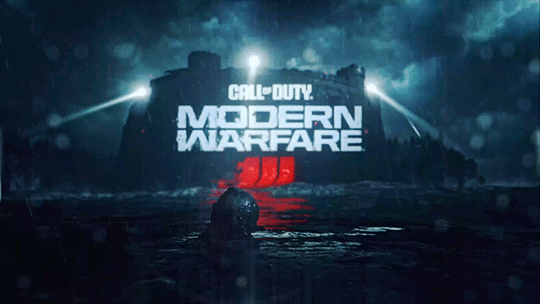
⚠️SPOILER ALERT⚠️
So… that was devastating.
(+) To start things off, Makarov - Boy, holy shit. Yes. YESSS. They didn’t hold back with the new Makarov. He’s a mastermind, he’s a charming fella, he’s a psychopath lol. And the fact that he smiles a lot in this campaign just adds to the creepiness. I might get some side-eye here, but this Mak can go head-to-head with the OG!Mak. He’s always onto something, he’s proven destructive, had the 141 hauling ASS to chase him.
Makarov had stolen American missiles from ULF, caused false flag missile attacks on Russian Military base, and successfully orchestrated a false airplane hijacking, all under ULF's name - everything in the span of 48 hours since he got out of prison. I saw people saying that this Makarov ain't got nothing on the OG one has to be inhaling some shit copium because this is only in one single game and he's destroying shit.
I know just one game with rushed development won’t be enough for an iconic character like him, so I’m glad they didn’t kill him.
(-) I absolutely ABHOR, DETEST, LOATH the Open Combat Missions (OCM). It is so very not Call of Duty campaignesque. it doesn’t help anything with the narrative, and if anything, it even took away the narrative for us. The former missions in former games are iconic in their own way because the mission designer put a lot of thought into how the game will be played, the situations we found ourselves in.
But OCM's, we're like... Left to our own devices without any story-driven dialogues.
I think one of the reasons why MWII was so close to everyone's heart was because of the banters between the characters, especially in Alone. Here, because it's literally our choice and our time, it left us with no actual given time to know and love the characters more than we already did. Yes we love the characters, MW19 and MWII did that for us. But in this one? They said "character development is done, mate. Now go to war.”
Then again, is OCM a product and evidence of MWIII’s rushed development? 100% yes. I don’t give a shit if they cover it with “oowh we make OCM so you can play the missions differently each time without repeating the same mission over and over again!”. Let me ask you this, Activision - Have ‘repeating the mission over and over again’ been a problem with us campaign-enjoyers? No! I played the MWII campaign like 5 times, in all difficulty (except realism I still love my life), and I enjoyed it, because the mission designers took a lot of time and thought to it instead of just creating a map, putting a bunch of loadouts scattered around the area and throw us in it. So yes, it’s clear that OCM is a product of rushed development. It sucks the life out of the campaign missions.
Some people may enjoy it, but I play the campaign exactly for the linear style missions, not DMZ style.
(+) Look, I said it before that I will go to the campaign with the lowest expectation possible. I expected Mak to be sub-par, I expected them to play safe with the characters, and BOY WAS I WRONG. Setting aside the point above where the character feels stuck on the character development (which is a huge minus btw), all the characters have time to shine in their own missions, especially Price because I feel like we play him the most. However, I do also love the fact that the girls get shit done here. Farah and Laswell did their work so beautifully and apparently it was revealed that Laswell will be a MP operator, so that’s cool.
(+) Ghost being a menacing presence, can stood his ground. Price being level-headed though at the same time unhinged as usual. Gaz being the voice of reason throughout the entire fucking game LMAO. Soap being the brave man he is, the passion and fury is evident throughout the campaign. Farah being badass and dependable as usual. Alex being the main supportive guy to Farah (Faralex is canon at this point argue with a wall). Nikolai being our most reliable get-away guy.
And of course, Graves and Shepherd being the fucking goofy ahh duo I actually find interesting. The trial cutscene was such a goofy scene LMAO the fact that they backstabbed each other in the ass is real funny. I side with Graves though. However wrong and unhinged he may be, Graves is just a guy doing his job and did what he’s told to do.
(+) I love the fact that Mak tried to frame Urzikstan to pin the blame on them. It's exactly what the OG!Makarov did but in HD. The Passenger mission is phenomenal and more damn traumatizing if only it was a bit longer and more stretched. There are many more reference to the OG games and I absolutely love it.
Now…
Soap’s Death
Remembering all the MWII missions with Soap... It hits differently now, man.
(-) I've read a lot of people's arguments about it that the fact that it happened is just for shock value and kind of disappointing. Because let’s be real here, Soap is an SAS who got the name Soap because of how much of a slippery bastard he is. Granted, Mak is an ex-Spetsnaz and can fight with Soap. But how he went down in a goddamn takedown without any chance of fighting is just… it’s not it.
To add to that, the reaction from the boys is just... Underwhelming? Like I get it they're battle-hardened SAS soldiers, but let them show some damn emotions for fuck’s sake. One of the main reason why the OG!Soap’s death is really painful is because of Price’s reaction to it. How he said “NO. NO NO NO SOAP!!” While he shook Soap’s lifeless body in the table. At least let Price kneel to him, straighten his body, touch his vest. Close his eyes, gather Soap’s hand and PUT HIS GUN ON his chest all the while Ghost and Gaz knelt beside them. I do love the fact that they literally went to Scotland to let go of his ashes with Ghost holding the urn though. I cried in this scene.
And the fact that it happened with the shortest campaign out of all the reboot MW games, it just felt rushed. Yes. It’s completely rushed, there’s no doubt about it. Again, the result of rushed developments.
(+) Now, with that said, I kind of want to shed light on how Soap is literally the youngest guy in the group. He had so much to live for. He's a sunshine in the middle of this gruff emotionally hardened man. He's such a joy to be around. He's brave. He's fresh. The fact that he's got so much to live for adds to the sadness and bitterness, which I actually like.
Sometimes I do kind of like those kinds of deaths, where the character is too soon to die, because it hit so much harder and in a different way than the OG! one. We got to see the OG!Soap went from when he was an FNG, turn to a captain, to a man of fortitude that earned Price's honor and sacrificed himself to protect Price. We saw how he developed and changed. We saw his entire career with us throughout all the OG!MW trilogy.
Reboot!Soap's story barely even started, and the fact that he's still so young, imagining how he'd be one hell of an officer, how he'd lead his team in the future.
OG!Soap’s death is sad because all the times and memories we’ve been through with him, but Reboot!Soap’s death is equally sad for the times we could’ve gone through with him.
I want to say this though, some people said that Soap's death is sudden, but I wouldn't agree with that. I think the telltales are all there.
In the helicopter scene after Price and Soap caught him in Verdansk, Mak literally SAID HIS FULL NAME. That is a literal pinpoint death sentence from Makarov. And how emotional Soap’s reaction is compared to the other boys when the airport blew up. The signs are literally all there! I saw it coming actually.
So is Soap’s death rushed? Yes. Could it have been executed better? Yes. Is it for shock value? Yes. But is it as sad? Yes. Honestly, I blame the rushed development and due dates for this. Activision is a cash grabber who wanted a yearly release so they can catch more money. I fucking bet my ass that initially they didn’t want to kill Soap, but it’s like a last-minute decision to make this game actually look like it’s worth 70 dollars.
Like by the end of the game, nothing has been accomplished. Big Bad Guy is on the loose, and we lost Soap. Yea we did stop some of Makarov's attacks, but we ended with a loss. It's a completely sad ending. I just wish we get to continue with more missions after Soap's death like in OG!MW3 though :(
WHAT'S NEXT?
Now. Shepherd is positively fucken dead. Price is now an actual criminal and a fugitive. He just killed a 4-star US Marines general in his own office. Price is entering his insane and unhinged era. I do wonder if he'll go even more unhinged than this.
The story will undoubtedly continue in the MP seasons (although probably only 2 seasons that mattered because it'll also undoubtedly be filled with skins and collabs and shit). I think it will also focus more on transitioning to the next CoD games, which will be Black Ops (It is confirmed that for the 2024 and 2025 CoD, it will be Black Ops games).
We're talking future here, so if there's going to be a CoD MWIV, It might be possible that this is the game where we'll finally defeat Makarov while the 141 copes with losing Soap. I do wonder if Price will become too unhinged and will get rid of everything on his way to kill Mak. Price's reckless acts will become too much for Gaz that it's starting to hurt other people and himself, and Gaz will do something against Price's command or wish - and Ghost will have to choose a side. Now that's the kind of drama I want to see.
What do I score this campaign, what do I score this campaign... The story is actually good, but because the development is evidently rushed, the packaging feels a bit hollow. It's a 7/10 for me!
---
Wait you know what
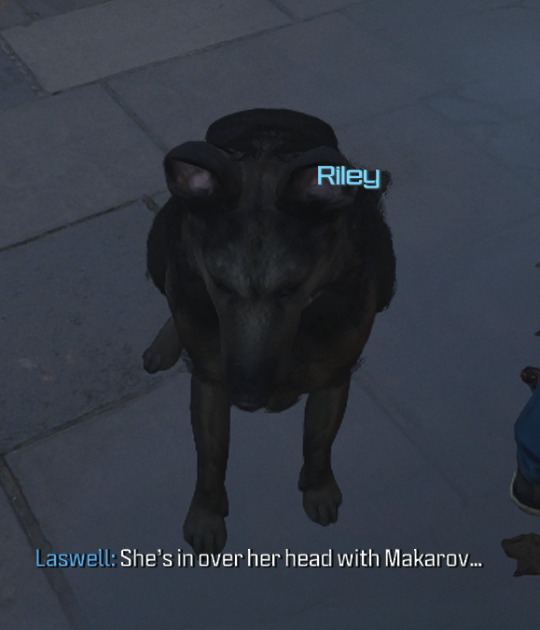
We get to pet a dog named Riley. 10/10, Game of The Fucking Year.
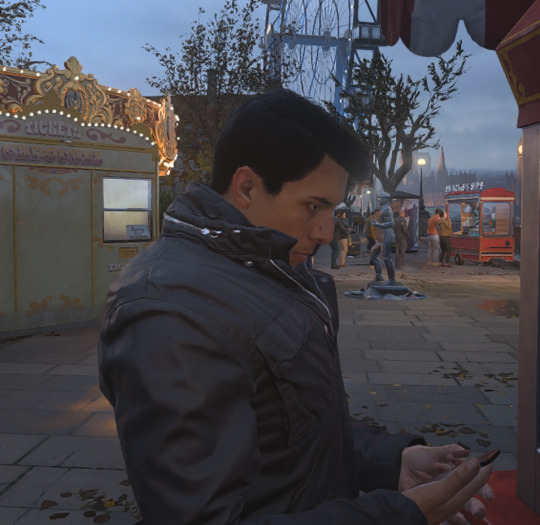
Reboot!Logan/Hesh (?) 👀
---
So there it goes! If you've read this far I love you and Activision will pay for my therapy (ʘ ͜ʖ ʘ)
#call of duty modern warfare iii spoilers#call of duty modern warfare 3 spoilers#mwiii spoilers#mw3 spoilers#call of duty#call of duty modern warfare#cod mw#cod#call of duty modern warfare III#call of duty modern warfare 3#call of duty modern warfare 2023#task forc 141#tf141#sleepy's game reviews
709 notes
·
View notes
Text
How Authors Can Use AI to Improve Their Writing Style
Artificial Intelligence (AI) is transforming the way authors approach writing, offering tools to refine style, enhance creativity, and boost productivity. By leveraging AI writing assistant authors can improve their craft in various ways.
1. Grammar and Style Enhancement
AI writing tools like Grammarly, ProWritingAid, and Hemingway Editor help authors refine their prose by correcting grammar, punctuation, and style inconsistencies. These tools offer real-time suggestions to enhance readability, eliminate redundancy, and maintain a consistent tone.
2. Idea Generation and Inspiration
AI can assist in brainstorming and overcoming writer’s block. Platforms like OneAIChat, ChatGPT and Sudowrite provide writing prompts, generate story ideas, and even suggest plot twists. These AI systems analyze existing content and propose creative directions, helping authors develop compelling narratives.
3. Improving Readability and Engagement
AI-driven readability analyzers assess sentence complexity and suggest simpler alternatives. Hemingway Editor, for example, highlights lengthy or passive sentences, making writing more engaging and accessible. This ensures clarity and impact, especially for broader audiences.
4. Personalizing Writing Style
AI-powered tools can analyze an author's writing patterns and provide personalized feedback. They help maintain a consistent voice, ensuring that the writer’s unique style remains intact while refining structure and coherence.
5. Research and Fact-Checking
AI-powered search engines and summarization tools help authors verify facts, gather relevant data, and condense complex information quickly. This is particularly useful for non-fiction writers and journalists who require accuracy and efficiency.
Conclusion
By integrating AI into their writing process, authors can enhance their style, improve efficiency, and foster creativity. While AI should not replace human intuition, it serves as a valuable assistant, enabling writers to produce polished and impactful content effortlessly.
38 notes
·
View notes
Note
Hii do you have any recommendations for bl that’s similar to Bad Buddy, My School President, and Semantic Error? Idk I’m looking for something fluffy, but with some angst for flavor (also potentially school setting but it doesn’t have to be). Anyways thank you so much!! 💟💟
10 Fluffy Yet Angsty BLs + School Setting (By Request Rec List)
Examples: Bad Buddy, My School President, Semantic Error
Interesting selection. I added the "school setting" to keep me tailored down. Let's see what we got.
You'll never guess how we are gonna start...
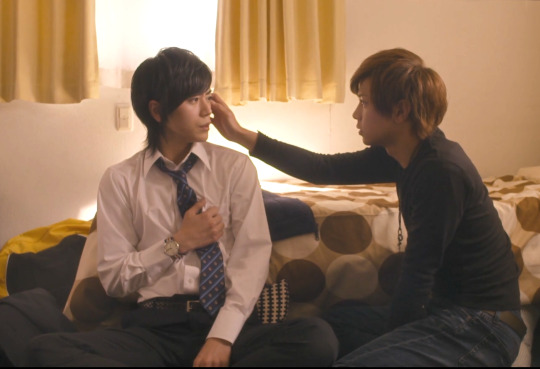
Did ya guess?
Seven Days
Japan 2015 - grey
Never doubt my ability to recommend this show. One of the best live action yaois ever made, with perfectly structured angst, fantastic characters and acting, and no problematic tropes (rare in Japanese BL). The leads have excellent chemistry although it’s low heat there’s still some really cute mutual kisses.
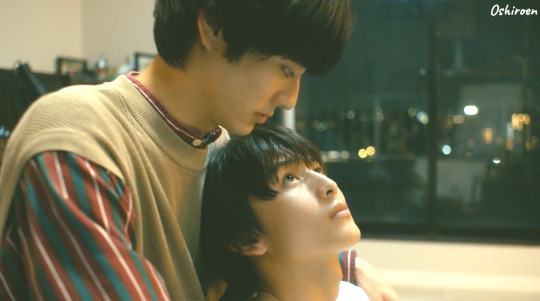
I Cannot Reach You
AKA Kimi ni wa Todokanai
Japan 2023 - Netflix
This classic friends-to-lovers BL is everything Japan does best. Angsty. Emo. Aching. Driven by real thirst. Yamato is deeply in love with his childhood bestie, Kakeru, and has been for ages, unable to hide his ungainly damaging high school need. He wants Kakeru in every way possible and it oozes off of the screen. Kakeru is silly and a little simple, but not frenetic or overly camp about it. He is earnest, and genuinely wants to keep Yamato in his life which means giving a romance (and gayness) a fair chance. We watch him realize his affection and what form it can take in a truly authentic way. This show was impossibly kind to both of its lead characters and I felt almost honored that I got to watch something so lovely and rare play out on my screen. Full review.
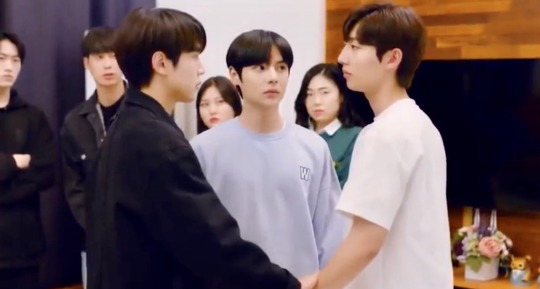
Light On Me
Korea 2021 Viki
Korea does an elegant pastiche of traditional live action yaoi but all tropes are cleverly deployed to bolster one of the most riveting love triangles ever put on screen… and I don’t like love triangles. LoM strategically tailors classic BL tropes to 2 different semes resulting in pristine pacing, plot, and character development, explicitly serving narrative (not just to tick boxes). LoM is a master class in this trope drops. (If you write fanfic or romance you should study this show.) Full review.
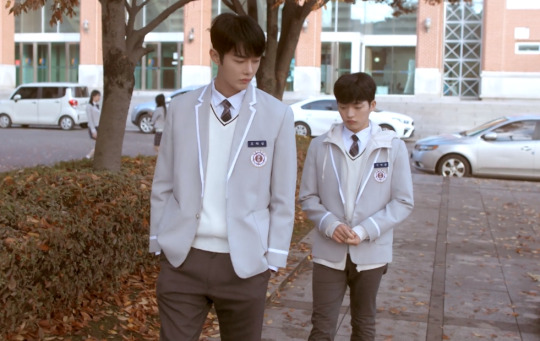
Cherry Blossoms After Winter
Korea 2022 Viki
Korea took on early Japanese sweet yaoi but gave it their signature softness and precise production with a STUNNING color palette (beautiful pastels, sun-saturated over-exposure), manga framg style, some traditional BL character archetypes, that tiny edge of bullying roughness and out-of-control seme, plus FINALLY a palatable take on the stepbrothers trope and it was, in a word, classic. Sophisticated and understated CBAW is not slow, it’s just subtle. It's dream-like and atmospheric, as if the whole thing took place under cold water on a warm spring day. Is there plot or peril? Not really. Do we care? Also, not really. Look, I can’t help it, I’m old school and so is this show. I grew up reading sweet yaoi, and this was THAT YAOI just on my screen. There’s no objectivity with me and this show. It’s a beautiful pastiche and I loved it for how it made me feel and what it remded me of. It’s not flawless, but it is a wonderful experience. Full review.

Takara-kun and Amagi-kun
Japan 2022 Gaga and Viki
I gnawed on my knuckles and squealed a lot with this show. Reserved cool kid who must learn to communicate to keep the tiny disaster nugget he’s madly in love with. It is beyond charmg: soft and gentle, packed with cuteness and high school angst, thirst, & yearning. Was there plot? Not really. Was it emotionally tense and paced well enough for me not to notice? Absolutely. Did I enjoy the hell out of it? Oh yes. Full review.

Blueming
Korea 2022 - iQIYI
It’s a tiny bit dark and a tiny bit bittersweet, almost too honest to a university experience and first love for BL, but if you want your md ever-so-slightly messed with and your intimacy hellishly sweet, this BL will do it for you in a coldly distant manner, while bitch slapping you with self worth issues. I wasn’t into it at first, but the leads are solid and by ep 5 it got really good, becomg a narrative about self discovery meets understanding and accepting others people’s flaws without hurting them. Ultimately we witnessed two characters maturing because of each other and their mutual affection, without that affection becomg the conflict point. Instead, tension was built around other aspects of identity, popularity, and self-worth. While production values were a touch lower than usual for Korea, Bluemg included decent kisses and other forms of intimacy and a satisfying ending plus there’s judicious and very elegant use of tropes, this is a great BL. Full review.
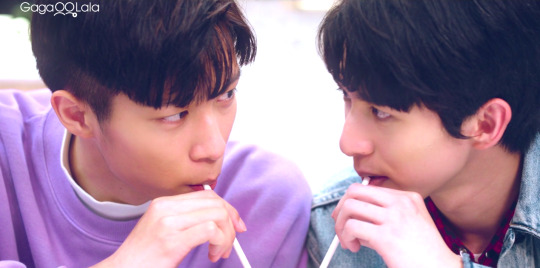
About Youth
Taiwan 2022 - Gaga
A truly lovely little coming of age high school BL with a classic YA low drama but high angst and an earnest depth. I didn’t even mind the singing, and that’s saying a lot. A weak seme/uke dynamic but tons of BL tropes (both rare in a high school setting but common for Taiwan) makes this one feel both sweet and colored by real world authenticity and grit. Full review.
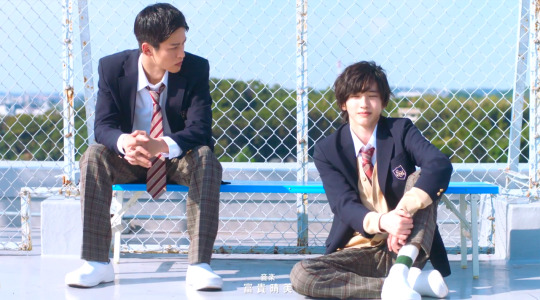
My Love Mix Up
AKA Kieta Hatsukoi
Japan 2021 - Viki
Completely adorable absolute chaos bi disaster muffin falls accidentally and utterly in love with his classmate, hijinx and friendship result. What’s great about this BL is that it deals with things like homophobia, asexuality, and one sided affection in an extremely gentle and palatable way. Perhaps sometimes too subtle, but I believe this is a great show for younger audiences, particularly if you want to spark conversations about identity, sexuality, authority, truthfulness, and consent. Oh and it’s funny.
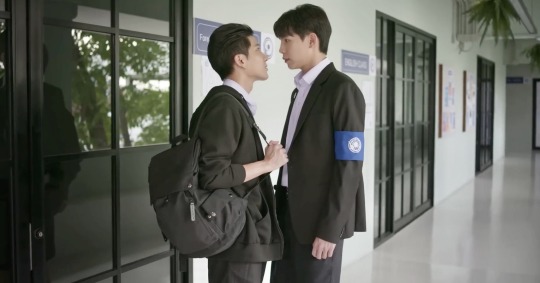
The Eclipse
Thai 2022 - YouTube
GMMTV does gay Blacklist with a good boy/bad boy pairing. This is a good show but the cast is excellent and the leads are absolutely flawless, which elevates it beyond just good. We got a nuanced and multifaceted burgeoning relationship: philosophical (and socio-political) conflict contrasted to moments of empathy; flirtation contrasted to moments of genuine affection, plus plenty of angst. This narrative is less about love than it is about courage and tenderness. However, near the end the pacing was off and the plot frustrating. Still, this is an enjoyable watch, with a finale that features verbal consent and a fun blooper reel.
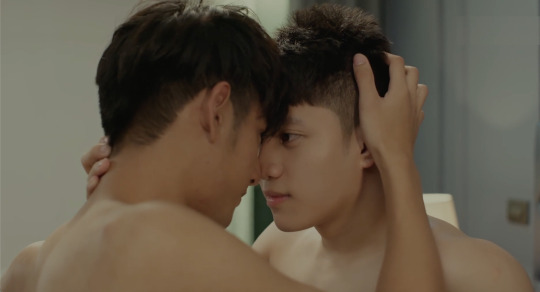
Destiny Seeker
Thai 2023 - WeTV
Frankly this probubly ranks along side most of hte runners up, but it's chronically under watched so I wanted to give it a special shout out.
A darn near perfect pulp featuring 3 likable grumpy/sunshine pairings with uncomplicated iterations of enemies to lovers. At least one half of each does a decent amount of pining and there’s good chemistry, classic tropes, and communication rep. It’s fun and full of linguistic jokes. Sublimely cheesy but a good rainy day offering with tons of rewatch potential. Full review.
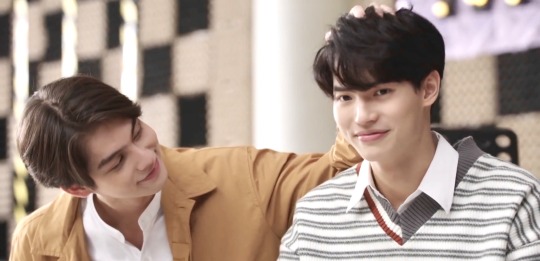
Honorable mention
These satisfy your criteria but I jsut personally like the above 10 better. And you did ask me, still OPTIONS!
2gether & Still 2gether
A Breeze of Love
Between Us
Dark Blue Kiss (+ Kiss Me Again - PeteKao Cut)
Hidden Agenda
Love By Chance
Love Class
Love Class 2
SOTUS
Star in My Mind
TharnType
Theory of Love
Why R U? Thailand
Why R U? Korea
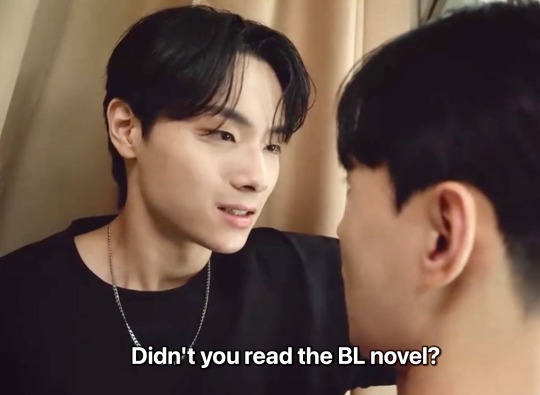
(source)
#By Request BL Rec List#BL by request#asked and answered#japanese bl#thai bl#korean bl#taiwanese bl#Bad Buddy#My School President#Semantic Error#seven days the series#I Cannot Reach You#Kimi ni wa Todokanai#light on me#cherry blossoms after winter#Takara-kun and Amagi-kun#blueming#About Youth the series#About Youth#My Love Mix Up#Kieta Hatsukoi#the eclipse the series#destiny seeker
151 notes
·
View notes
Text
Maybe it's because I don't mind unhappy or open endings, or maybe it's because I had no expectations whatsoever beyond being entertained, or maybe it's because I enjoy detective fiction a lot...
But I genuinely liked Spare Me Your Mercy beginning to end. I enjoyed the characters and the presentations of their struggles, flaws and convictions, and I also don't think that it's a mark of bad writing or narrative structuring when characters are unbending and stand by said convictions. I like how the outcome was inevitable pretty much from the beginning because every character was on a set trajectory. And I also liked how the "big bad" was unveiled/dealt with way before the show was over because Boss was never the real obstacle anyway.
Spare Me Your Mercy was never going to be a romantic thriller driven by character development, and personally I feel it's a bit unfair to judge the show by the standards of a completely different genre. To me it was a morality tale/crime thriller and imo it did a very good job in that regard. Plus, if you take Thai censorship laws/conventions into account it was never going to openly support Kan's approach to euthanasia. It was always going to end with the status quo being upheld. They went about as far as they could, given that this is a mainstream production aired nationally on television. I actually find it very refreshing that they tackled this topic at all, and I really appreciate that they were incredibly nuanced throughout all of it, from the inclusion of a living will (which is indeed a topic that surprisingly few people even know about) to the monk's approach, but also how it showed that loved ones too have every right and the room to disagree.
Because euthanasia shouldn't ever an easy topic. It should be discussed, always, even in countries like Switzerland and the Netherlands where it's already legal.
(This is also ultimately why I sided with Tiu/Wasan instead of Kan because, yeah, Kan did consensually ease the suffering of a lot of people and we as the audience know that he has the highest of moral standards - which is exactly why it's better to channel all of this into starting the democratic process of legalising it. Kan meant well, and maybe Kan was right, but you only need to look to Orn and Boss to see how easy these things go off the rails. Hell, even Kan slipped when he shot Boss in the back, and you can't justify that one at all.)
Plus, in the end I do think that Kan manipulated Wasan as much (or imo even more) as it was the other way around. To me a relationship based on so many fundamental lies was never going to be possible - which also explains the dissonance in their (romantic) behaviour. Attraction is easy (which is why I don't think it's far-fetched at all that they fell for each other) but sometimes love alone just isn't enough.
I won't begrudge anyone their dislike of the show or its characters. I think it's very valid especially given the sensitive nature of what euthanasia should and shouldn't be. It's just that I read so many disappointed and negative takes on the ending of the show in the past 24 hours that I wanted to add my own - and like I said, personally I enjoyed myself a lot (even if it's of course not a perfect show and there certainly are some details that feel very hamfisted and even harmful and stereotypical). To me, it's a well-made and narratively sound piece of television with interesting characters and an entertaining story, and I'm glad we finally got a good genre BL offering in the form of queer detective fiction.
#spare me your mercy#spare me your mercy the series#jane watches stuff#will i regret this? maybe#and i maybe too neutral. yeah probably.#there's so much more i want to write esp about the inclusion of the monk's perspective#but it's christmas and i'm around people 24/7
78 notes
·
View notes
Note
Here’s the thing I DON’T understand ever since being in the Helluva Boss fandom.
I’ll never be one to claim that Helluva Boss is a masterclass of storytelling, because it’s not. It has its flaws: plot structure is a bit disjointed at times, tonal consistency could be better, sometimes the humor is not well balanced with the emotional moments, and some episodes can suffer from speed rail pacing, “Mastermind” is the first episode that comes to mind.
But also a lot of what this show does well with its characters still makes up for it, and the show has been getting better about ironing out the flaws I mentioned.
The show’s writing isn’t perfect, but it’s far from having the worst writing I’ve ever seen, so…why does is it THIS show that pushes people’s buttons so much?
Why is THIS the show that sparks the creation of hundreds of YouTube videos with over 50k views or more yelling about how much people think it sucks?
🤖💁🏽♀️: Your point about the disproportionate criticism of Helluva Boss touches on a significant issue in media reception: the relationship between production context and audience expectations. It’s undeniable that Helluva Boss faces an outsized level of scrutiny, and much of that can be attributed to the fact that it’s an independently produced series created by Vivienne Medrano, a highly visible and accessible online figure. Unlike shows backed by established production companies, Helluva Boss operates without the institutional legitimacy that often insulates mainstream media from this level of hyper-focus.
For comparison, consider Avatar: The Last Airbender and Bojack Horseman, two critically acclaimed shows produced by major companies—Nickelodeon and Netflix, respectively. Both series benefit from larger budgets, industry connections, and an inherent credibility that allows their audiences to extend more generosity toward their flaws. And while these shows are widely celebrated, they are not without their shortcomings. Avatar, for all its masterful world-building and character development, struggles with romantic subplots. The dynamic between Aang and Katara often feels forced and awkward, with Aang’s possessiveness clashing against Katara’s more maternal demeanor. Meanwhile, Zuko and Mai’s relationship lacks chemistry, (💁🏽♀️: though Mai’s defiance of Azula? “I love him more than I fear you.” — rad af).
ANYWAY.
Similarly, Bojack Horseman, while lauded for its exploration of mental health and the consequences of fame, is deserving of some of its criticism for its jarring tonal shifts between absurd comedy and bleak drama. Bojack himself frequently escapes meaningful consequences for his actions in ways that challenge narrative cohesion. However, these flaws are typically contextualized as part of the show’s complexity rather than as fundamental failures, largely due to its association with a respected platform like Netflix.
In contrast, Helluva Boss is rarely afforded the same critical nuance. The show’s tonal experimentation (arguably a feature, not a bug) and character-driven storytelling are often dismissed as structural weaknesses rather than creative choices. This disparity can be partly attributed to the persistent “hate boner” directed at Medrano, whose visibility as a creator makes her a convenient target for criticism. The expectation that independent creators should produce flawless content, while mainstream studios are forgiven their imperfections, reveals an inherent bias in media consumption.
Ultimately, no media text is perfect—not Avatar, not Bojack, and certainly not Helluva Boss. But the point of analysis should not be to determine whether a show is “good” or “bad” in absolute terms. Thoughtful critique involves engaging with a text on its own terms, recognizing both its achievements and its limitations without letting external biases dictate its value. The disproportionate vitriol directed at Helluva Boss says more about the audience’s biases and expectations than it does about the show’s quality.
And on a personal note? We enjoy our gay demon furry cartoon 🤷🏽♀️🤖💖
#this is a vivziepop neutral blog#vivziepop#Spindlehorse#hellaverse discourse#helluva boss#helluva boss meta#hellaverse#fandom meta
35 notes
·
View notes
Text
Is "Star Wars" better without lightsabers?
No, the audience is growing up and the world is developing

I recently realized how Star Wars productions evolve and adapt to the current state of the world, showing the spirit of time. We arrived from fairy tale to reality.
The 1977 movie was a small low budget film containing all the classic narrative tropes possible - from the good guys vs bad guys, including even saving the princess in distress. The whole original trilogy is a fantasy-sci-fi-idea-driven fairy tale. A pretty picture with pretty people, sophisticated fighting scenes and a tragic love story. And a happy ending. A theater play on a screen.
The prequels are similar but the plot is more developed towards showing the politics and the roots of the conflict. Also Anakin as this handsome male protagonist is very early 2000s core.
Then, the creators realized how the franchise sparked the interest of the younger audience, so we get Clone Wars and Rebels and other kinds of productions catered towards children.
In 2015 the force awakens and in the new trilogy the protagonists are a female and a black guy. And as the world becomes more vocal about representation of minorities, we see more of it in Star Wars as well.
The series Ahsoka shows so many different women. I criticized it before here but I appreciate the effort, it's a start and we'll get there someday.
Andor shows the struggle of normal people in their everyday life including the ugly aspects of the world and society we experience (class inequality, bureaucracy, propaganda, etc). All these factors exist in previous SW productions but aren't that exposed and evident. Also both the imperial forces and the team of rebels are diverse in terms of representation.
Is Star Wars better without lightsabers then? No, Star Wars just responds to what's happening in the world and delivers what we can identify with. We no longer wanna watch princesses in distress, we wanna watch real people saving themselves.
#star wars#star wars rebels#star wars series#star wars andor#star wars original trilogy#star wars prequels#star wars ahsoka#star wars women#ahsoka series#andor series
22 notes
·
View notes
Text
Article from Bloomberg by Jason Schreier, under a cut due to length.
"New ‘Dragon Age’ Game Faced Turbulent Development The studio head of EA’s BioWare says ‘Dragon Age: The Veilguard’ received nothing but support from EA throughout its lengthy production cycle EA’s BioWare label hopes to find redemption with the release of Dragon Age: The Veilguard Today we’re getting in-depth on the new Dragon Age game A new age for dragons In late 2020, when Gary McKay took over as studio head of BioWare, the Electronic Arts Inc. subsidiary best known for making big roleplaying games, the climate was dire. BioWare, which is headquartered in Edmonton, Alberta, had released two critically panned games and was facing turbulent development on a new one — while trying to cope with a worldwide pandemic. “We needed to shift how we were thinking about building our games,” McKay told me in a recent interview. BioWare, founded in 1995 and purchased by EA in 2007, had won over millions of fans with hit single-player RPG franchises such as Dragon Age and Mass Effect. But a 2017 entry called Mass Effect: Andromeda was widely panned, and the studio’s next game, the 2019 multiplayer shooter Anthem, flopped both critically and commercially. Both games had also gone through brutal development cycles that drove many BioWare veterans to exit the studio. At the end of 2020, studio boss Casey Hudson was planning to step down and called McKay to ask if he would take over. “We had a few conversations over the course of the next month around the people and the culture,” McKay said. BioWare’s next big project would be a new game in the popular fantasy Dragon Age franchise. But the game, which had been in development for years, was facing turmoil and had been rebooted from a single-player game into a live-service game with a heavy multiplayer component, which EA had been pushing across many of its subsidiaries in the late 2010s. Hudson, too, was interested in multiplayer games and had been the lead visionary on Anthem. Some employees jeeringly referred to the next Dragon Age as “Anthem with dragons,” which worried fans after I reported on the game at Kotaku. Enthusiasts of the series wanted another single-player game, not a repeat of BioWare’s biggest mistake. When he took over, McKay began to feel similarly. “We were thinking, ‘Does this make sense, does this play into our strengths, or is this going to be another challenge we have to face?’” McKay said. “No, we need to get back to what we’re really great at.” In the months that followed, McKay met with leadership across BioWare and EA and ultimately decided to reboot the next Dragon Age a second time, pivoting back to single-player."
The choice was obvious in many ways. Anthem had flopped while EA’s Star Wars Jedi: Fallen Order, a single-player action-adventure game, had sold more than 10 million copies, helping prove to the publisher that not all of its games needed to be online. BioWare games were popular because of their focus on character dialogue and player-driven narrative decisions, which did not mesh with multiplayer gaming. “Once we made that decision, a lot of things started to fall into place,” McKay said. In the years that followed, he would go on to consolidate more of the studio’s projects, shutting down an attempt to reboot Anthem and selling off the rights to the online game Star Wars: The Old Republic to a separate studio. The goal, McKay said, was “focus.” BioWare then spent the next three-and-a-half years developing what would become Dragon Age: The Veilguard, the fourth game in the franchise. Out this week, the game has received mostly positive reviews and so far topped charts, although EA has not yet revealed sales numbers. Some things went right during development. McKay said they “had the game end-to-end playable” earlier than any previous BioWare product, allowing them to spend extra time iterating. A reorganization at EA, which split the company into divisions called EA Games and EA Sports, allowed Dragon Age: The Veilguard to receive more support from internal teams that might otherwise be stretched thin, such as research and data insights groups. “That gave us an extra boost in terms of the support and focus from the company,” McKay said. But the development of Dragon Age: The Veilguard still faced plenty of obstacles. The pandemic led BioWare to shift to hiring remotely, which McKay said made for cultural challenges. The game slipped past its original target date, although McKay wouldn’t say how much extra time it needed. “I’m never going to call it a slip,” he said. And it went through significant scope changes over the course of development. Then, last summer, BioWare laid off 50 people, including veterans with decades of experience. McKay told me the reduction, which arrived during a period of widespread layoffs across the video-game industry, “was all about focus at that time.” “When you have a really large team, you’re always compelled to keep everybody busy all the time,” he said. “When you have a smaller team, you have the right people in the right roles at the right time, some incredible momentum is gained at that point.” The stakes are high for the release of Dragon Age: The Veilguard. Fans and pundits have worried that a third failure in a row might have devastating results for BioWare. McKay wouldn’t comment on the specifics of what would make the game a hit in their eyes. But said he has felt supported by EA Entertainment & Technology President Laura Miele. The game is so important to BioWare’s future that the company brought in its second team, which has been incubating a new Mass Effect, to help out during the final stretch of development. The Mass Effect team played a major role in finishing and polishing Dragon Age: The Veilguard. Other companies across EA, such as its Motive studio in Montreal, also supported the game. Now, the company will look to see how players react to the next Dragon Age — and, McKay hopes, “bring BioWare back into the conversation as a top game studio.”
[source]
#dragon age: the veilguard#dragon age: dreadwolf#dragon age 4#the dread wolf rises#da4#dragon age#bioware#video games#longpost#long post#covid mention#mass effect#mass effect: andromeda#mass effect 5#sw:tor#anthem#(this is from nov 1. but i'm still looking through backlog piles of headlines from the time i was hiding in the spoilerbunker so this post#is late)
91 notes
·
View notes
Text
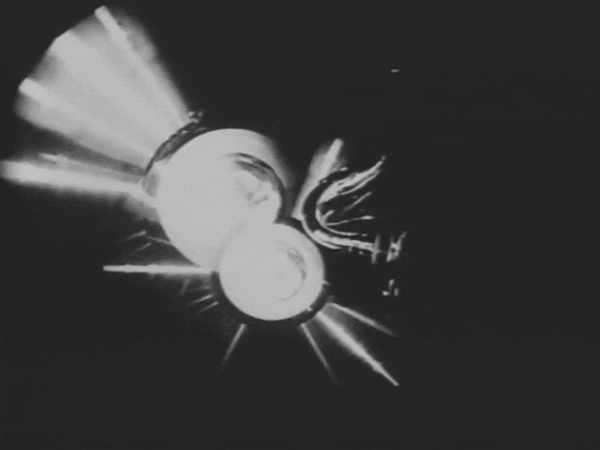
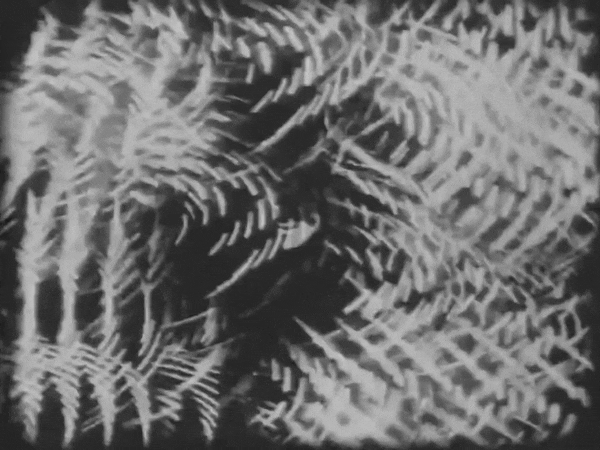

Disque 957 (1928)
[letterboxd | imdb]
Director: Germaine Dulac
Camera: Alfred Guichard
“The whole problem of cinema lies in its definition. Is real cinematic thought a philosophical, poetic, commentary on an event or an action in which images have only the value of a word or a sentence? Is it a faithful vision of life applied to the illustration of an idea? An unoriginal theme, could that not be the consequence of the destructive intrusion of literary forms into the cinema? "By literary intrusion I mean the technical device which is used to move us by the antiquated formulas of storytelling, plot exposition and resolution, according to the tradition of psychological mystery or drama, which constitute the basis for written or acted dramas. "In my opinion, this way of thinking about action has pushed cinema down a very bad road. Is there not action enough in motion itself which can change, evolve, and develop? “But why must action be subject to a dramatic situation as in the theater? Can we not conceive of an action based on the development of simple emotions as in music?[...] “Cinematic action? A feeling! The film a visual symphony. Down with storytelling!”
— “The True Spirit of the Seventh Art” by Germaine Dulac. Le Soir, 16 April 1925 [1] (emphasis mine)
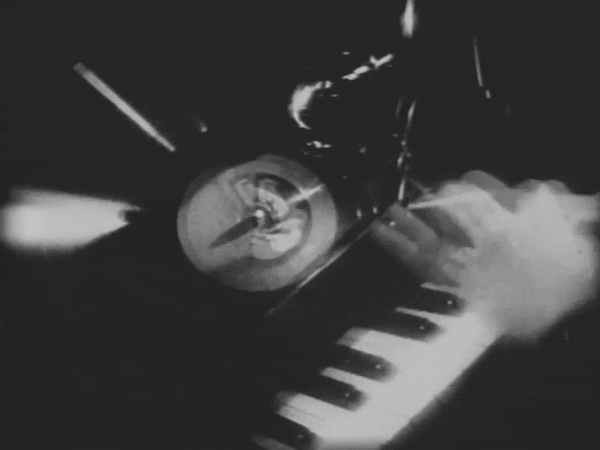


If you’ll allow me to be overdramatic for a moment, Germaine Dulac spent the 1920s engaged in a battle for the soul of cinema. Dulac was a renaissance woman: a filmmaker, theorist, critic, activist, and journalist. Dulac articulated her theories on the potential of film as an artform through articles (like the one quoted above), lectures, and interviews, while also taking every opportunity to test those theories in making her own films.
Cinema in the 1920s showed abundant signs of artistic stagnation, not just in France but in all capitalist countries (though each nation’s industry had their own flavour of stagnation). The French industry was struggling to build up film production after the devastation of the First World War. To make matters worse, distribution and exhibition markets in France were flooded with American imports. This is admittedly an oversimplification, but these factors directly fed into the growth of a purely commercial approach to cinema. It's easy to understand why Dulac felt a sense of urgency in fighting for a more expansive, artistic approach to filmmaking.
Dulac even-handedly observed in her writing/lecturing that the state of filmmaking in the 1920s was an artistic endeavor out of balance with its commercial element; that imbalance born out of the ever dominant profit motive. What that looked like on film was an insistence on a rote form of narrative filmmaking, overly reliant upon devices and conventions (mis)appropriated from literary or dramatic storytelling. This insistence was and is driven by the conservatism that pure profit motive engenders. Pushing the boundaries of an artform or experimenting with what that artform can accomplish is difficult (sometimes impossible) within a profit-driven industry.
Dulac’s militant stance against “literature” in cinema, shouldn’t be boiled down to an argument that novels or plays shouldn’t be adapted to film—a willfully reductive take TBH. Developed and redeveloped over years, Dulac’s ideas on this topic were shifting and dynamic. At its core, Dulac’s feeling was that directly repurposing devices from other pre-existing media was hamstringing the development of film as its own art. And, unfortunately, increased commerciality was locking cinema into a cycle of well-trodden styles and techniques that producers considered sure-fire profit. [2]

By the end of the 1920s, Dulac had amassed over a decade of filmmaking experience and had time and again used her filmmaking to investigate and fine-tune her ideas on film art. In that same moment, it became evident that sound would finally be joined to film as the standard mode. Dulac’s work had reached the apotheosis of her theories just as the medium was about to undergo a foundational shift!
Following what is regarded as her magnum opus, the impressionist film The Seashell and the Clergyman (1928), Dulac created three experimental abstract shorts that put her theories of visual rhythm to the test: Disque 957, Arabesques, and Themes and Variations. These films are a culmination of common themes in Dulac’s writing and in her films: capturing an impression, revealing inner, psychological life, and proving the film medium’s commonalities with music. Dulac sought the cinematic equivalent of a symphony. Disque 957 is an especially compelling manifestation of these ideas.
The film was intended to be projected silently—though it exists in conversation with Chopin’s preludes 5 and 6. Rather than a soundtrack, the “musicality” of the film comes from the harmony and rhythm of its images.[3] Disque 957 begins with a quote by George Sand, reflecting on the works composed by her companion, Frédéric Chopin, during their ill-fated trip to Majorca. Chopin and Sand intended to spend the winter in Majorca as Chopin was trying to recover from tuberculosis. Unfortunately, it rained torrentially for much of their stay. In Sand’s recollection, quoted at the beginning of the film, Chopin’s preludes are haunted by the sound of the rain on the tiles outside their rented house. Sand immortalized the trip in her book Un Hiver a Majorque. [4]

Disque 957 finds a swirling set of reference points in Chopin’s preludes, Sand’s recollections and Dulac’s impressions of listening to the preludes. Dulac brings these elements together to inform the moving images, their organization, and the visual rhythm that organization creates. In the end, Dulac puts to film the feeling of listening to Chopin’s preludes with the knowledge of that winter in Majorca.
In a way, Dulac’s experiment revealed hints to an alternative path where “literary” source material (here Sand’s travelogue) could provide direct inspiration for a cinematic work without sacrificing filmic art in favor of literary conventions. Disque 957 is both a cinematic snapshot of a psychological state and proof of cinema’s (yes, silent cinema’s) relationship to music.
It’s almost poetic to consider these experiments in abstraction being made just as the technological shift of sound would further cement the industry’s reliance on literary/dramatic conventions. The evolution of Dulac’s films and theories (and those of other filmmakers dedicated to the artistic development of the medium) obviously didn’t die out with the coming of sound. Many of the concepts Dulac interrogated remain relevant—especially given the current state of filmmaking. Though Dulac’s legacy is only now being restored in film history, her ideas were not erased. Many filmmakers and theorists after Dulac, including Maya Deren,[5] similarly fought for the integral poetics of film over strict narrative drama.
One of the key figures in recovering Dulac’s legacy is Professor Tami M. Williams, who wrote the must-read Germaine Dulac: A Cinema of Sensations. So, I’d like to close with a quote from Williams’ book (that in turn quotes from Dulac’s essay “Les Esthétiques”):
“For [Dulac], cinema, unlike literature, should not be recountable, but should ‘draw upon its active or emotive principals in images of visual vibrations alone.’ Of the rhythm of the images, Dulac states: ‘Their emotional value became so great, and the link between them so logical that their expression alone had value without the assistance of a text.’”
——— ——— ———
☕Appreciate my work? Buy me a coffee! ☕
——— ——— ———
[1] from Writings on Cinema, 1919-1937 by Germaine Dulac, ed. Prosper Hillairet & trans. Scott Hammen
[2] If you’ve been around the blog for a minute, this might sound familiar—it’s a related conflict to what I covered in my Salomé and Omar Khayyam essays, only from the other side of the Atlantic.
[3] This differentiates it from experimental musical films timed to be synchronized with a specific piece of music like those of Dudley Murphy, Mary-Ellen Bute, or Dulac’s own “Illustrated Record” films, which she made for Isis Films.
[4] The Sand quote used in the film is her reflection on that winter, but it's not quoted directly from the book.
[5] The French and American avant-garde have a lot of connections, but I’m not sure if Deren was exposed directly to Dulac’s films or writings. (If only Robert Haller were still with us, I would have already shot off a letter to him about it!) There are a lot of noteworthy similarities between the two filmmakers: Deren was also a theorist/filmmaker who would write articles and give lectures to accompany her films. Some of Deren’s preoccupations are clearly direct descendants of Dulac’s—her concept of innocent receptivity, her rejection of dramatic devices, and her preoccupation with scientific filmmaking—to name just a few. Maybe even more fascinating is that their films have so very little in common, though both filmmakers shared theoretical sensibilities and also a deep appreciation for dance on film. Kinda goes to show the amazing potential of film art IMO! Also, coincidentally, both filmmakers had creative disputes over their films with prominent poets: Dulac with Antonin Artaud over The Seashell and the Clergyman and Deren with Anaïs Nin over Ritual in Transfigured Time (1946).
#1920s#1928#Germaine Dulac#my gifs#cinema#film#french cinema#french film#film history#film theory#frederic chopin#george sand#cinematography#experimental film#avant-garde film#short film#women filmmakers#female film directors#abstract art#abstract film#impressionism#filmblr#black and white#classic film#classic cinema#classic movies
30 notes
·
View notes
Text
Elsa and albinism

Summary:
My edit Albinism Testimonials My headcanon
My edit
After seeing several edicts of the albino version of Elsa, I also wanted to do an edict of Elsa as a child, but it's not perfect. This person did it better than me.
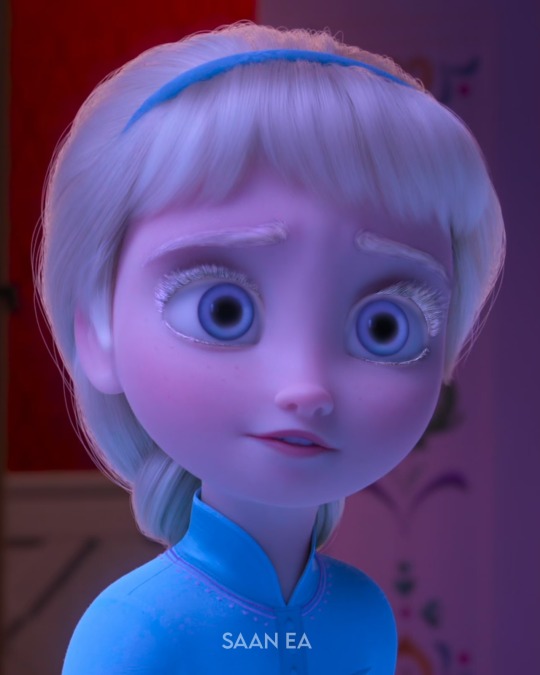
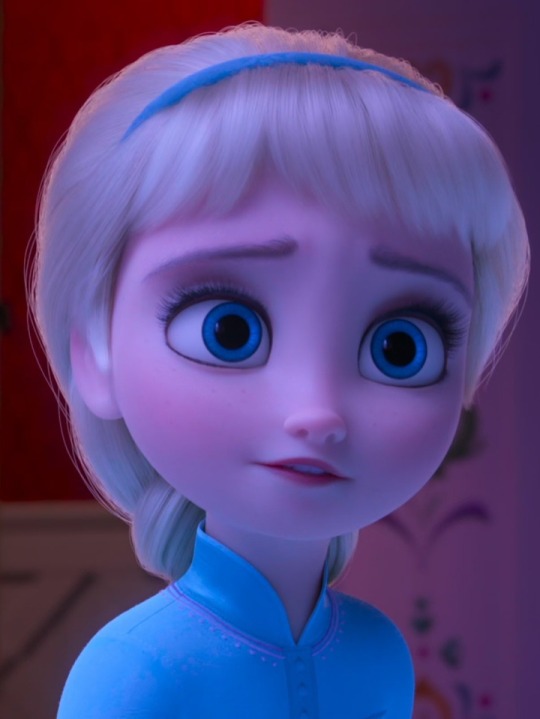
Edits by diahanach ⤵
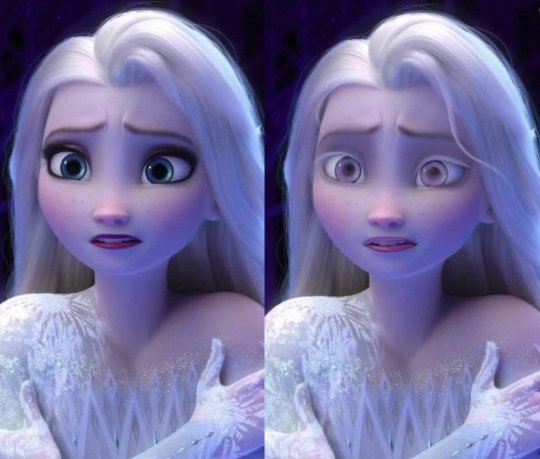
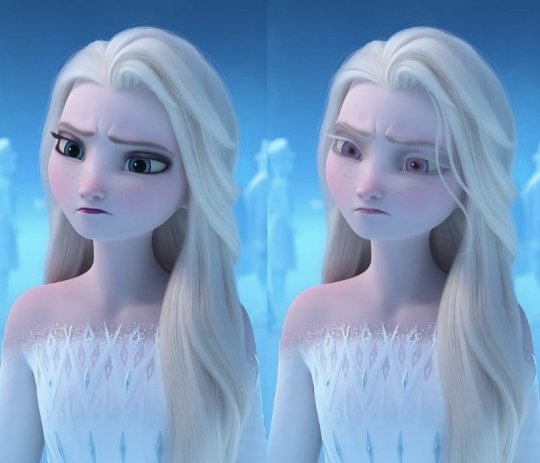
Albinism
Albinism is a rare, non-transmissible genetic disease that is inherited regardless of ethnicity. This rare genetic disorder affects pigmentation and is characterized by a deficit in melanin production. It can take several forms, depending on the genes responsible, with some forms affecting only the eyes and others affecting both eyes and skin. This genetic disease can result in a total absence of melanin pigment in the iris and integuments (epidermis, hair and body hair), despite the normal presence of pigment cells or melanocytes. Albinos are generally characterized by very light skin and hair.
However, albinism does not affect overall health, but they will need specific sun protection because their skin is sensitive to the sun and can develop skin cancer, and they also need eye care. There are several types of albinism, and the severity of the condition can vary according to the people affected. In terms of the color spectrum, they may have a full spectrum of colors, but on the other hand they may have certain visual peculiarities that affect their color perception and visual acuity. In some countries, people with albinism suffer discrimination, poverty, stigmatization, violence and even death. In some countries, women who give birth to a child with albinism are repudiated by their husbands, and their children are abandoned or victims of infanticide.
Although albinism is a genetic disease, it remains purely genetic. For a person to be born albino, both parents must carry the albinism gene. A parent carrying the gene is not necessarily albino, but if both parents carry the gene, they will have a 1 in 2 chance of having an albino child. If one parent out of 2 carries the gene, the child will not be albino, but will have a 50% chance of carrying the gene. If neither parent is a carrier, the child will be neither albino nor a carrier. If both parents have albinism, the child will also be albino.


Here are some links if you want to know more about albinism:
Testimonials
First testimonial: How Frozen's Elsa helped a little girl with albinism.
“Elsa from Frozen is recognisable the world over, but for one family she is more than just a Disney character. Canadian folklorist and journalist Emily Urquhart explains how the Queen of Arendelle became a positive role model for her daughter's albinism.”
“It is my daughter's first day at school and I nestle Sadie into line amongst her kindergarten classmates. Despite her many layers, strands of white hair poke out from beneath her hat and over the neck of her scarf. The little boy standing behind her leans in for a better look and shouts out "Hey, you have hair just like Elsa!" For the uninitiated, Elsa, is the popular protagonist of the animated box office hit, Frozen. As a princess she is able to conjure up ice castles with her fingers and when her powers get out of control, locks herself away to protect her court. For my daughter, the comparison is positive. Princess culture makes me cringe for all its misogynistic old-fashioned values, and yet, I'm alright with Elsa, who first appeared in 2013 when Sadie was three. Not because she's a strong female lead without a prince-driven narrative, but because she has white hair like my daughter. The difference is, Elsa's hair is a manifestation of her icy prowess and Sadie has albinism - meaning she has little to no pigment in her hair, skin and eyes and wears glasses to correct what she can of her low vision.”
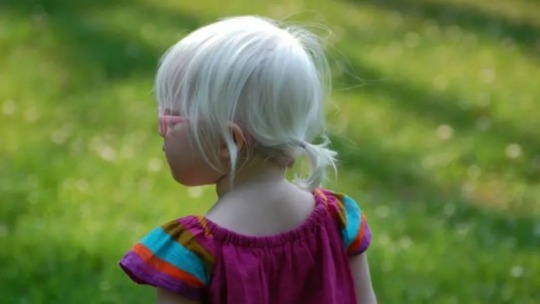
“The little boy who noticed my daughter's hair is just one of thousands of people who have remarked on her ivory locks. It began in the delivery room as half the hospital came to "see the white-haired baby" - only the janitor suggested she might have a genetic condition. On average we hear up to five comments a day - from "wow, her hair is really white" to "did you bleach her hair? or "are you Swedish?". Now, I am so accustomed to hearing comments I barely register them, but then, as a new mother, those remarks emphasized my concerns for her future. A few years later and strangers began likening Sadie to Elsa and it was as if this ubiquitous Disney character somehow normalised my daughter's difference. For now, my daughter is a Frozen fan, so this works and gives people a positive hook to hang their comments on, although I do worry when Elsa is jettisoned in favour of other, new, characters. Traditionally however, Hollywood has not been so kind. Characters who resembled people with albinism have been the villain, an evil other who is frightening and strange. Films like The Matrix Reloaded with Keanu Reeves and TV series Doctor Who have all used evil or strange "albino" tropes, but this is just one strand of mythology that surrounds this condition. Sadie was born when I was studying for my PhD in folklore at Memorial University, Newfoundland and I found myself drifting away to research albinism and other cases of human differences in folklore.”
Source :
Second testimony: “I can't get her to be anything else”: Mother of a four-year-old girl with Albinism reveals how her daughter has found confidence again by dressing up as Elsa from Frozen.
● Hailey Brown was initially overwhelmed to discover her firstborn had Albinism
● She and daughter Arliyah were often approached by strangers touching her hair
● Things began to change when a child said the little girl looked like Princess Elsa
● Arliyah thinks she is Elsa and proudly shows her sister who also has Albinism
“A young girl with Albinism has found confidence in herself from an unexpected place - Disney's famous film, Frozen. Four-year-old Arliyah Brown, from Queensland, had been the subject of stares and sometimes cruel questions before the film was released and another child pointed out she looked like Princess Elsa. After watching the film, Arliyah now believes she is Elsa, and will take any opportunity to dress up as her possible.”

Source :
Here are photo portraits of women with albinism in the 19th century:

Emma Millie LeMar Morrissey

?

Young Nellie Walker with her brother

Nellie Walker
My headcanon
A few days ago I imagined and improvised a scenario based on these edicts, some theories about Elsa being albino and what I've learned about albinism. Without realizing it, I've sort of created my own headcanon about Elsa's albinism and I want to share it here.
Elsa hides her albinism as well as her powers all these years.
Ever since she was a child, Elsa has always known that she is albino, and the doctor and dermatologist regularly came to examine her to see if she had any other problems. In the 19th century, medicine wasn't as developed as it is today, so doctors did their best, but some patients were mistreated. The doctor who regularly came to examine Elsa gave little information to Agnarr and Iduna (the parents), and Elsa didn't know much about it either. One day, Agnarr and Iduna wanted to know more about albinism. The doctor didn't want to worry them, but they really wanted to know more for their eldest daughter. They were already aware that she could have skin and eyesight problems, Iduna often made her a cream that was both moisturizing and protective against the sun, and Elsa saw an ophthalmologist from time to time who recommended a pair of resting glasses with anti-reflective lenses and eyeglasses just in case, but they knew nothing more. I mentioned above, with the help of an article to which I've also provided a link, that albinos are discriminated against, abandoned by their parents and sometimes abducted from their families and killed. This is what the doctor explained to them in order to warn them and preserve the child. In those days people were quite religious, but some were quite superstitious and believed in prejudices, for example in some countries there were beliefs that people with albinism brought good luck, so sometimes they sold their hair or whatever, and in some countries albinism was considered to be something bad.
How did Elsa hide her albinism?
This idea didn't come from her (she was only about 8 years old) or her parents, it came from the doctor who recommended that they have the make-up artist from the castle come and put coloring henna on her eyelashes and eyebrows. For those who don't know what henna is, here's a picture:

“Henna, known scientifically as Lawsonia inermis, is a flowering plant that has been used for centuries for its cosmetic, medicinal and cultural properties.”
Agnarr and Iduna had initially refused to color their eldest daughter's eyelashes and eyebrows, but the doctor insisted, so they desperately agreed. The henna can last 3 to 4 weeks before it fades and disappears. A few days later, I can imagine that the isolation had taken place and Anna didn't remember much except that she and Elsa were accomplices. Every 3 or 4 weeks for 13 years, the make-up artist applied henna to her eyes, and the ophthalmologist recommended that she wear colored contact lenses, which would turn her eyes an ordinary blue.
Have you noticed that Elsa often wears long sleeves?
After “Let it go”, although she now leaves her shoulders free, most of her outfits still have long sleeves, even in summer. The only time she wears a short-sleeved outfit is in Frozen fever for Anna's birthday. Anna also wears long-sleeved outfits most of the time, but less than Elsa, she has worn short sleeves at least 4 or 5 times, such as her children's pyjamas at the very beginning of Frozen 1 and 2, as well as the outfit where she sings “Do you want to build a snowman?” when she was still 5, her ball gown on Elsa's coronation day and her Birthday outfit in Frozen fever. It reminds me that Elsa has to keep her skin as safe as possible from the sun.
In my mind, Elsa also has naturally curly hair, and so far wears wigs that are 1 or 2 shades darker than her natural color. In fact, in the concept art for the first film, Elsa had several different hairstyles, and as you can see in some of the concept art, her hair is wavy, almost curly. But this wig idea is a bit crazy. That's all for this article, I'll also talk about Anna and redhead genetics in another article.
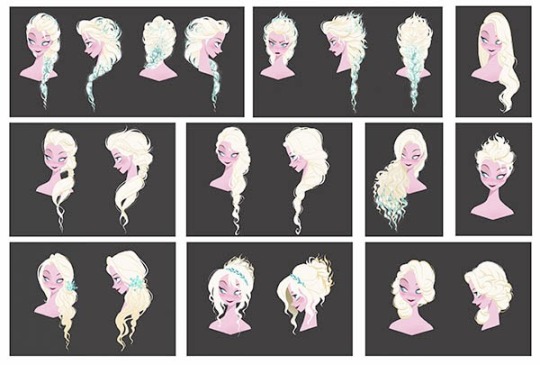
❆
I really enjoyed writing this article and couldn't wait to share it here and I hope you've learned a few things too, I love tackling this kind of subject while staying in theme with the Frozen universe. ❄️
#frozen#frozen fever#olaf's frozen adventure#frozen 2#elsa#elsa frozen#young elsa#queen elsa#queen elsa of arendelle#albinism#albinos#human albinism#rare genetic disease#genetic#disney#disney frozen#disney animation#disney princess
34 notes
·
View notes
Note
It’s funny what that anon said. Tom is a person that has his heart in his sleeve, he is very outspoken. He likes acting but he sees it at a job. I think to distance who he is in real life. I remember Alfred Molina talking about Tom’s behavior on set, his level of knowledge and that he can see him as a Director one day. He launched Bero but He clearly said in that Christmas food interview in the UK, that this business is just a 1 time thing that he is primarily an actor
Tell me who will create a production company, gets a production deal with Sony and has already 4 projects in development, Tom as the lead actor in 3 plus the lead in American Speed with Amazing Studios. That is not the behavior of a person that doesn’t want to act. Tom could be doing just marvel movies, earning millions and doesn’t act in anything else, but he is doing the opposite.
His comments about not working when he has kids is not something new in actors. So many take years off to be with their kids. Some actors even decide to take jobs only in LA or NY where they live to give their kids some sort of normality. By the way Tom can’t say he won’t work now but who knows.
Z has talked about having kids too but she is very guarded she will not elaborate in the matter. But because she is very family driven, nobody has to be surprised if she takes time off from acting. And yes there are some blogs that push the narrative of househusband for Tom and Zendaya working, this narrative pissed Tom’s fans. Ignore them, as someone said about Hollywood don’t believe what I say believe what I do, meaning believe in my actions and Tom’s actions are a very interesting slate of movies in the pipeline
Agree x1,000! 👏🏾
25 notes
·
View notes
Text
Epic: The Musical - Lyric Textual Analysis 1 - The Infant and the Horse
(Skip to the end if you want to just see my analysis of The Infant and the Horse.)
I hope you like Epic: The Musical (if so, you're in good company here), because we're gonna be talking about it here. We're gonna be talking about it in depth, and we're gonna be talking about it a lot. And we're gonna be talking about it for quite a while.
As I mentioned in yesterday's blogpost, one of primary approaches in the development of Psychagogue: A Digital Musical is through a close and thorough analysis of Epic. Eventually, I plan to analyze other seminal works of musical theatre and miscellaneous other specific relevant works. In a sense, I know I like the body of Epic, but in order to create something, I need to understand its bones, its sinews, its nerves and muscles. By surgically extracting key information, I can study the specimen to build up a foundation to understand why I like it and use that framework to reverse-engineer them to create something of my own.

Like any good house, I am building on a solid foundation of bones. In this case, the bones are the basic storytelling elements of the narrative. Specifically, the text itself. And if you haven't done a lot of literary analysis before, that's okay, but I will say now that whenever I use the word "text" in this blog, I am being deliberate with its meaning. I mean "text" in this case to mean the explicitly written words that compose the work. If that seems obvious, then consider what text isn't. Text is not subtext. Text is not an implication (even a really strong one). Text is incontrovertible, an undeniable fact of the narrative. You can have implications and interpretations that are supported by the text, but I am making that distinction here early on. If we use the show-tell dichotomy, text is the explicit tell. Subtext is the implicit show.
With that out of the way, let's take a look at this S✨P✨R✨E✨A✨D✨S✨H✨E✨E✨T
I might change the format for later entries, but for now, the spreadsheet is divided into 5 main sections:
Song info - Basic information about the song including its title, a link to listen to it, and a link to the full lyrics.
Core elements - I have a running theory that every narrative-driven song (that should be like all of them in a Musical Theatre context I think?) has a core conflict, a resolution of some sort, and the central philosophy, tension, or question can be identified within a single quote. This often, but not always, is the title of the song itself.
The Narrative situation - In what ways does this song actually move the plot forward. Like, what literally happens in this song? Unfortunately, 40 songs in a row about some people in a blank white room singing about their feelings wouldn't make for much of a story. In the context of a musical, I will be working under the idea that they are purely told in song, without any non-song connective tissue. If you go see buy some tickets to your local theatre's staged production of Legally Blonde: The Musical or something similar, you'll likely see a hybrid approach, but I'm going to take Epic's approach on this one and keep everything song-only. (That's right, that means no ARG either. Probably.)
Factual Character information - What do we learn about these characters? Factually, demographically? What contextual information do we actually have about this person singing about his feelings? Odysseus is a soldier from Ithaca. Zeus is a god from Ithaca. Morvic is an adolescent from a small coastal town.
Character relationships/philosophies/perspectives - Similar to factual information, but more about how each character interacts with the world around them. What do they believe in? How do they feel about the situations and characters around them?
With the preamble out of the way, here's the actual results I came up with. Note that this phase of analysis focuses purely on the lyrics of the songs in Epic: The Musical. (This also means that yes, at this phase, the information here will be obvious. You might look at these results and think "duh". That's intentional. This analysis is important as part of the overarching effort of understanding the writing techniques Jorge Rivera-Herrans is using to make information obvious.) For now I am not touching on any musical motifs (yes, Penelope's leitmotif can be heard in the pause between lyrics, yes Odysseus is definitely thinking of her in that moment, no that is not directly stated or implied by the text of the lyrics. Implied by the text of the music itself maybe, but that's a conversation for another day.)
Without further ado:
Epic: The Musical - Lyric Textual Analysis 1 - The Infant and the Horse
Central Conflict:
Odysseus is faced with a difficult choice. He either has to kill a defenseless baby or allow his home and family to be completely destroyed once the baby grows up. He loves his family dearly but is distraught at the idea of committing such an act.
Resolution:
Odysseus must make this difficult decision right now.
Thesis Quote (Fundamental question or philosophy):
"It's just an infant, it's just a boy"
What factual information do we explicitly learn about the situation?
Odysseus and his men have been at war against the Trojans for 10 years
Right now, Odysseus and his crew are beginning to execute a decisive counterattack.
Odysseus and his crew are planning to enter and take the city.
Odysseus' attack becomes interrupted by some unknown force
Odysseus gets a vision of the future from the gods. This future is certain, but can be changed if Odysseus takes action right now.
Odysseus must kill Prince Hector's son in order to avoid the future that the vision shows.
Prince Hector's son is a baby
If Odysseus does not kill Prince Hector's son right now, the boy will grow up and enact vengeance upon Odysseus. Specific consequences include, but are not limited to destroying his home and killing Penelope.
If Odysseus attempts to circumvent this fate another way, he will fail. The gods themselves will ensure that if the boy lives, that this fate will come to pass.
What factual information do we implicitly learn about the situation?
Troy has had a slight upper hand in the war up to now.
The crew's attack on Troy is successful.
What factual information do we explicitly learn about a character?
Odysseus is a soldier in a war who has been fighting against Troy for at least 10 years.
Odysseus is a noble of some sort.
Odysseus has never been in a situation where he has had to consider killing a defenseless baby.
Many of the men in the crew have families at home.
What factual information do we implicitly learn about a character?
Odysseus is the commander of a group of soldiers.
Penelope and Telemachus are Odysseus' family members.
Zeus is a god, but not the only god. He has powers including knowing information about people's lives and the ability to give people visions of the future. The gods interfere in people's lives.
What information do we explicitly learn about a character's relationships, perspectives, or philosophies?
Odysseus considers the soldiers under his command his brothers.
Odysseus is motivated by his connection to Penelope and Telemachus.
Zeus doubts Odysseus' ability to make the difficult decision in choosing who must die.
What information do we implicitly learn about a character's relationships, perspectives, or philosophies?
Odysseus is an effective commander who has the trust of his men.
Odysseus has and values inner strength.
Odysseus has and values pride.
Odysseus values the ability to fight through pain.
Odysseus understands that it is important to have a motivation in order to keep yourself going.
Odysseus is highly confident of his own ability as a fighter.
Odysseus does not want to kill a defenseless baby. He wants to follow his sense of morality and does not have an inherent bloodlust. He would rather take on some amount of sacrifice than go against his morality in this way.
Odysseus is skilled at finding alternative solutions that do not involve killing.
Zeus is stubborn.
One thing I noticed was that the highest density categories for this piece were Explicit Narrative info and Implicit Character Perspective info. Makes I suppose for the first song, especially when the audience can reasonably be expected to come into the experience with some pre-existing knowledge. For establishing Odysseus, it was interesting to see what information was stated outright vs implied. I'll be curious to see how this proportion shifts from song to song.
If you're interested in ever viewing my analysis in depth, including the concrete lyrics backing each of these bullet points, as well as additional notes, I'll be keeping this spreadsheet link publicly available in View-only mode. Over time I will be adding more tabs for each song. My next post will be either another one of these analyses for "Just a Man", some Psychagogue world-building info I've been putting together over time that is almost ready to compile, or some musical ideas I was able to scrounge together.
Until then, that's all I've got for now.
#PsychagogueDigitalMusical#epic the musical#epic the musical analysis#epic analysis#lyrical analysis#spreadsheets#literary analysis#text#subtext#media analysis#media literacy#odysseus#ody#zeus#penelope#telemachus#The infant and the horse#epic the ithaca saga
25 notes
·
View notes
Text
✨AstralShift is officially on Tumblr!✨
Follow us here on Tumblr to keep up with every update — from Pocket Mirror ~ GoldenerTraum to Little Goody Two Shoes and our most recent title, Hell Maiden! 💖
⬇️Keep reading to find out more about AstralShift and our titles!
────────────────────────────────────────────
AstralShift is an independent game software development company based in Portugal.
Officially founded in 2022, AstralShift’s story started in 2016 with the release of the popular RPG maker title Pocket Mirror. With video games as its medium, AstralShift specializes in the production of narrative-driven and artistically ambitious games.

Pocket Mirror ~ GoldenerTraum is a surreal indie adventure game that will take you on a journey through a mysterious realm where nothing is what it seems and everything is connected.
As a young girl with a clouded past, you wake up in a strange and eerie mansion with nothing but your pocket mirror in hand.
In search of your memories, you must explore the twisted corridors and rooms of the mansion, solve puzzles, interact with unique characters, and uncover the truth behind your identity and the sinister forces that are at play.

Little Goody Two Shoes is a horror RPG where you follow Elise, a vibrant and ambitious young lass with a big dream – becoming filthy rich. In spite of this, the stars didn’t seem to have reserved our protagonist much fortune in life. Elise, who came from humble beginnings, had no choice but to spend her days away assisting her fellow neighbours with menial tasks to make a living.
One day, Elise discovers a pair of beautiful shiny red shoes buried in her backyard – what a surprise! Bewitched, Elise embarks on a fearful journey that pulls her closer and closer into the heart of the mysterious Woods!
Will Elise risk it all for the sake of a dream come true, or settle for her humble day-to-day life?
The ending of this tale is yours to write…
────────────────────────────────────────────
✨Find out more about AstralShift on LinkTree!
23 notes
·
View notes
Note
Hiya Loon Lagoon! 👋
I love the movies you mentioned earlier. “The Secret of Nimh” is a favorite of mine! I’m excited to hear you and Gwen from the daycare enjoy it. I absolutely adore Mrs. Brisby and her bravery.
The summary (and insight!) you gave on “FazRangers in Space” was really neat. I haven’t seen it, since I don’t think I can access Fazbear Entertainment content on the web (to my knowledge). However, I was very interested in all of the character relationships you detailed! It seems you like narratives that center on its characters more than the plot (I’m assuming). Which I’m all for! An action movie can be fun, but it’s even better when you care for the people in the film! Sometimes I think (newer) movies can get too bogged down with cool CGI effects and forget that the audience needs to connect with the characters too.
Princess Bunnie really interested me! I wish I could’ve witnessed how her relationship with the FazRangers (particularly Chica) developed. I am curious about the significance of her true name, “Princess Stella.” Do you know if there’s a reason she had another name?
I am sad to hear about how Freddy’s character was diluted to be more simple for the target audience. I can understand it, but as an avid Freddy Fazbear fan, I would’ve loved to hear that his dynamic traits were utilized. Glad he had his moments though! Even though I’m older than the daycare kids, I can relate to being jealous about losing the spotlight of someone’s affections. It hurts, but it’s nice to know the film approached those complicated feelings well.
Do you write essays and articles about other movies too? If you want to share, I’d be happy to read them! You’re very good at pointing out the plot points and narrative flow in films. Thanks for the info, it was really nice!
(This is a longer one, haha. Don’t feel pressured to reply soon. There is a lot happening right now.)

LOON: OhmyFazbear. Someone who watched the FazRangers series. It’s so hard to find anyone else who still remembers it beyond nostalgia (nothing wrong with that I just want to talk critically about the show but no one can find it online so it’s really hard at this rate I might just reupload my memory file of it but it would be soooo sooo soooo illegal I would be terminated on sight)
PRINCESS STELLA I LOVE HER. I LOVE PRINCESS STELLA. OKAY so I think that Princess Stella had another name to show she actually was trying to be another person the whole time while going through the preliminary stages of friendship. Doesn’t everyone pretend to be a little more palatable when you start getting to know a stranger? I mean for a kids cartoon, this is pretty awesome, but I think I’m reading too much into it. Maybe. Also because I think they had a different design or idea for the character and changed it partway through production but couldn’t scrap it? i read a forum post on this but the forum got taken down because the thread was just arguing.
I absolutely agree that the character driven narrative here was so good for the show. Freddy didn’t get the development he deserves, but I feel like he doesn’t have a lot of room to be given a true and strong personality with meaningful flaws because he’s supposed to be what kids wanna be, right? A friendly, confident, humble, and honest character that helps his friends when they need him! FazBear Entertainment isn’t really into building strong and compelling character driven narratives for kids, since all of our favorite characters get put into episodic shorts, but this film… WOWZA!!
I have written a little ramble about this film because it’s like, one of the only ones I really enjoyed watching over and over in the video corner, but I need to edit and redo it so you can read it easier.
Also, that nickname is so very silly! I love it. Thank you, Friend Omm :)
⭐️ (LOON is happy you asked him about one of his special interests. You got a GOLD STAR. It has a beautiful, sparkling princess on it.)
#loon tag#ic#inbox#anonymous#FAZRANGERS MENTION#sticker book#<- gold star tag so you guys can keep track of all ur lil achievements
8 notes
·
View notes